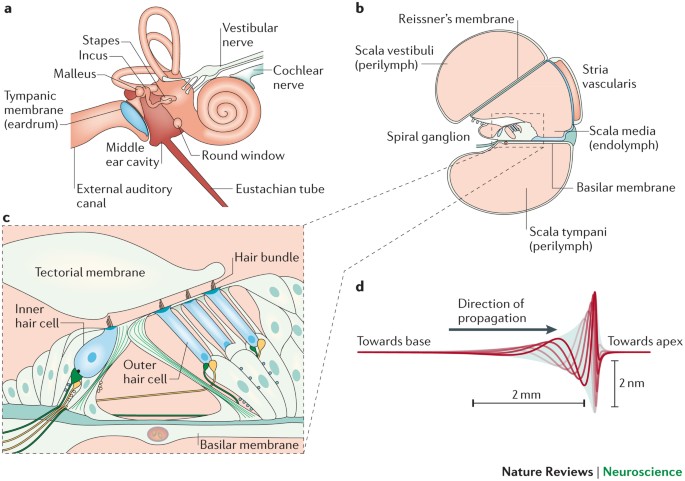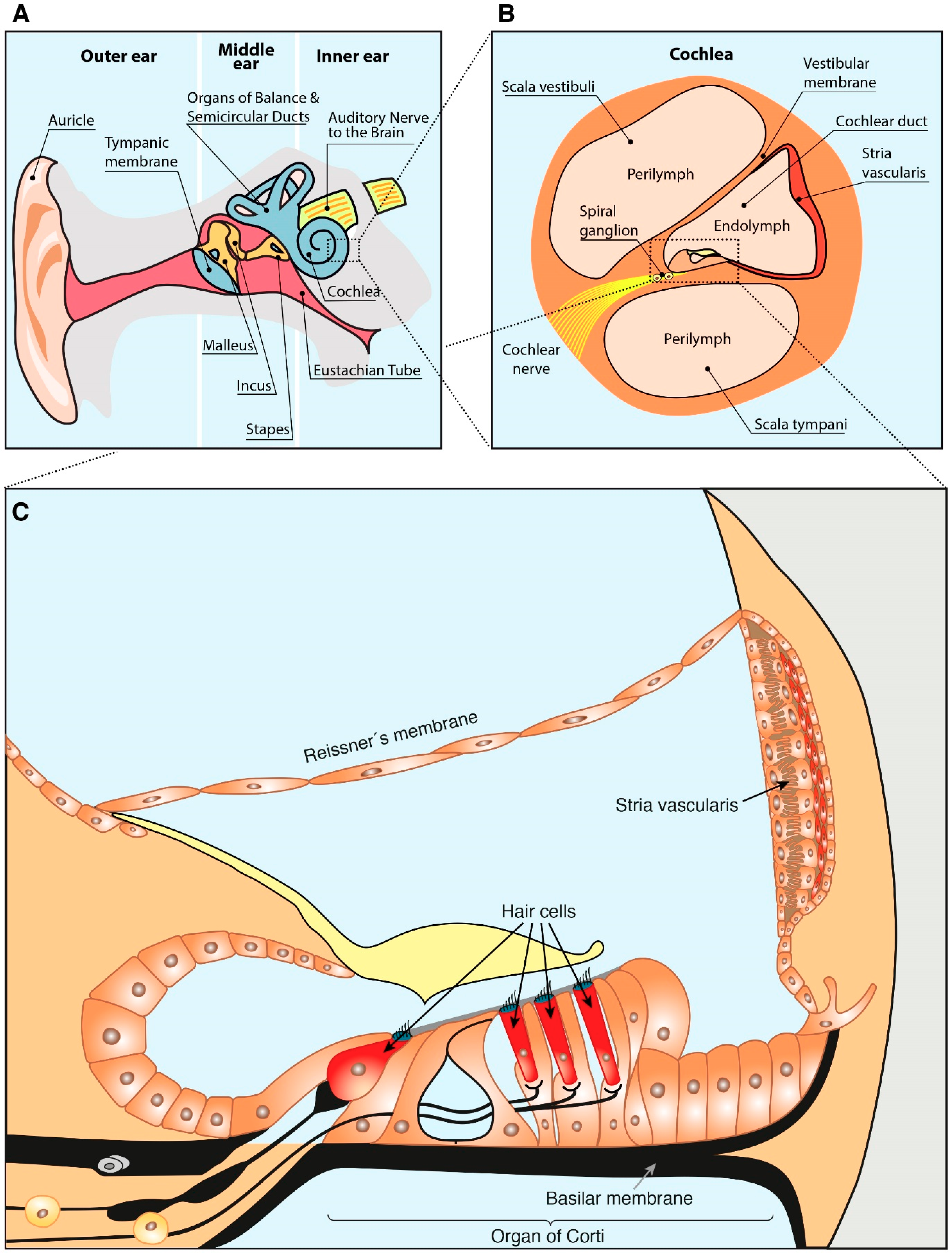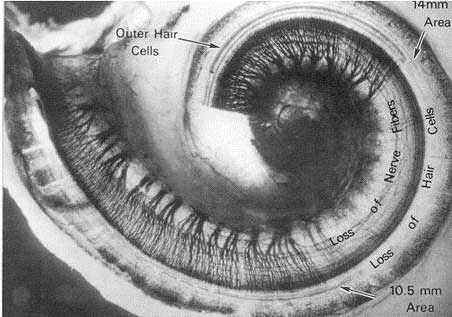
Your Damage to the cochleas hair cell receptors is most likely to cause a loss of images are ready. Damage to the cochleas hair cell receptors is most likely to cause a loss of are a topic that is being searched for and liked by netizens today. You can Download the Damage to the cochleas hair cell receptors is most likely to cause a loss of files here. Get all free vectors.
If you’re looking for damage to the cochleas hair cell receptors is most likely to cause a loss of pictures information linked to the damage to the cochleas hair cell receptors is most likely to cause a loss of topic, you have come to the right blog. Our site frequently gives you suggestions for seeking the maximum quality video and picture content, please kindly search and locate more enlightening video articles and images that match your interests.
Damage To The Cochleas Hair Cell Receptors Is Most Likely To Cause A Loss Of. Damaged Hair Cells HearingLoss Effects of Outer Hair Cell DamageSevere precipitous high frequencysensorineural hearing loss may reflectcochlear dead spotsGenerally audiogram regions greater thaneighty-five to ninety decibels reflect thesedead hair cell regions. The hair cells are the most vulnerable elements in the cochlea and damage to them is the most common cause of sensorineural hearing loss. Damaged Hair Cells in Your Ears Can Lead to Hearing Loss. To date the molecular mechanisms underlying the maintenance of these delicate sensory hair cells are unknown.
 Anatomy Of The Cochlear Hair Cells Left Panel Organization Of The Download Scientific Diagram From researchgate.net
Anatomy Of The Cochlear Hair Cells Left Panel Organization Of The Download Scientific Diagram From researchgate.net
Exposure to loud noise can cause cochlear damage. The average person is born with about 16000 hair cells within their cochlea. What this implies is that damage to the sensory hair cells in the cochlea may be the primary cause of presbycusis and that suggests age-related hearing loss is not an inevitable consequence of. The result is hearing loss or ringing in the ear that cannot be reversed. This is not the first time the coronavirus has shown to affect ears. A team of scientists has demonstrated that age-related hearing loss is caused by damage to hair cells the sensory cells in the inner ear that transform sound-induced vibrations into the.
What this implies is that damage to the sensory hair cells in the cochlea may be the primary cause of presbycusis and that suggests age-related hearing loss is not an inevitable consequence of.
OHCs are the most susceptible to damage and the most common cause of noise-induced hearing loss. What this implies is that damage to the sensory hair cells in the cochlea may be the primary cause of presbycusis and that suggests age-related hearing loss is not an inevitable consequence of. A very strong movement of the basilar membrane due to very loud noise may cause hair cells to die. First of all you can have varying degrees of cochlear damage. In humans and other mammals any damage that results in hair cell death can lead to irreparable hearing loss due to the inability of mature mammalian hair cells to regenerate. If only a few hair cells are damaged the result may only be a mild amount of hearing loss.
 Source: sciencedirect.com
Source: sciencedirect.com
In this case the hair cells may still be there but they may require more sound before they are able to move back and forth to send sound up to the brain. Contributions to TTS include reversible damage to hair cell HC stereocilia or synapses while moderate TTS reflects protective purinergic hearing adaptation. Damage to the cochleas hair cell receptors is most likely to cause a loss of A kinesthesia. The cilia can be easily damaged which may cause the hair cells to die. The result is hearing loss or ringing in the ear that cannot be reversed.
 Source: houghear.org
Source: houghear.org
A very strong movement of the basilar membrane due to very loud noise may cause hair cells to die. Up to 30 to 50 of hair cells can be damaged or destroyed before changes in your hearing can be measured by a. These hair cell receptors reside in the organ of Corti and function to transduce mechanical stimuli into electrical signals that mediate hearing. Contributions to TTS include reversible damage to hair cell HC stereocilia or synapses while moderate TTS reflects protective purinergic hearing adaptation. Damage to the cochleas hair cell receptors is most likely to cause a loss of A kinesthesia.
 Source: researchgate.net
Source: researchgate.net
To date the molecular mechanisms underlying the maintenance of these delicate sensory hair cells are unknown. Loss of OHCs reduces vibration and causes hearing loss. Damaged Hair Cells in Your Ears Can Lead to Hearing Loss. Unfortunately if hair cells are damaged or die they cant be replaced at the moment. The nerve impulses created by the hair cells travel along the auditory nerve also called the cochlear nerve eventually reaching the section of the brain thats concerned with hearing.
 Source: researchgate.net
Source: researchgate.net
This is not the first time the coronavirus has shown to affect ears. According to the gate-control theory a back massage would most likely reduce your physical aches and pains by causing activation of nerve fibers in your spinal cord. This is a common cause of partial hearing loss and is the reason why users of firearms or heavy machinery often wear earmuffs or earplugs. A cochlear implant would be most helpful for those who suffer sensorineural hearing loss small differences in the intensity of a sound received by each ear enable us to identify the ______ of the sound. The result is hearing loss or ringing in the ear that cannot be reversed.
 Source: nature.com
Source: nature.com
Normal aging can bring about gradual partial hearing loss. A team of scientists has demonstrated that age-related hearing loss is caused by damage to hair cells the sensory cells in the inner ear that transform sound-induced vibrations into the. The result is hearing loss or ringing in the ear that cannot be reversed. A very strong movement of the basilar membrane due to very loud noise may cause hair cells to die. The principle cause of NIHL is damage to cochlear hair cells and associated synaptopathy.
 Source: researchgate.net
Source: researchgate.net
Higher frequencies do not propagate to the helicotrema due to the stiffness-mediated tonotopy. Up to 30 to 50 of hair cells can be damaged or destroyed before changes in your hearing can be measured by a. The result is hearing loss or ringing in the ear that cannot be reversed. First of all you can have varying degrees of cochlear damage. Loss of OHCs reduces vibration and causes hearing loss.
 Source: cell.com
Source: cell.com
These cells allow your brain to detect sounds. The cochlea of the mammalian inner ear contains three rows of outer hair cells and a single row of inner hair cells. Outer hair cells OHCs dont transmit sound to the brain but are critical for mechanically adjusting vibration in the cochlea to amplify quiet sounds and dampen loud sounds. In humans and other mammals any damage that results in hair cell death can lead to irreparable hearing loss due to the inability of mature mammalian hair cells to regenerate. Loudness is to amplitude as pitch is to A intensity.
 Source: mdpi.com
Source: mdpi.com
The cilia can be easily damaged which may cause the hair cells to die. Loss of OHCs reduces vibration and causes hearing loss. Contributions to TTS include reversible damage to hair cell HC stereocilia or synapses while moderate TTS reflects protective purinergic hearing adaptation. These hair cell receptors reside in the organ of Corti and function to transduce mechanical stimuli into electrical signals that mediate hearing. The principle cause of NIHL is damage to cochlear hair cells and associated synaptopathy.
 Source: sciencedirect.com
Source: sciencedirect.com
These cells allow your brain to detect sounds. Damaged Hair Cells HearingLoss Effects of Outer Hair Cell DamageSevere precipitous high frequencysensorineural hearing loss may reflectcochlear dead spotsGenerally audiogram regions greater thaneighty-five to ninety decibels reflect thesedead hair cell regions. The result is hearing loss or ringing in the ear that cannot be reversed. Understanding the intracellular events that lead to the death of hair cells is a key to developing protective strategies. This is a common cause of partial hearing loss and is the reason why users of firearms or heavy machinery often wear earmuffs or earplugs.
 Source: researchgate.net
Source: researchgate.net
Unfortunately if hair cells are damaged or die they cant be replaced at the moment. The hair cells are the most vulnerable elements in the cochlea and damage to them is the most common cause of sensorineural hearing loss. First of all you can have varying degrees of cochlear damage. To date the molecular mechanisms underlying the maintenance of these delicate sensory hair cells are unknown. Damage to the cochleas hair cell receptors is most likely to cause a loss of A kinesthesia.
 Source: researchgate.net
Source: researchgate.net
This is not the first time the coronavirus has shown to affect ears. The result is hearing loss or ringing in the ear that cannot be reversed. The principle cause of NIHL is damage to cochlear hair cells and associated synaptopathy. A team of scientists has demonstrated that age-related hearing loss is caused by damage to hair cells the sensory cells in the inner ear that transform sound-induced vibrations into the. OHCs are the most susceptible to damage and the most common cause of noise-induced hearing loss.
 Source: eliteaudiologyservices.com
Source: eliteaudiologyservices.com
PTS represents permanent damage to or loss of HCs and synapses. By contrast the hair cells of many non-mammalian vertebrates such as birds and amphibians have a significant regenerative capacity. Loss of OHCs reduces vibration and causes hearing loss. A cochlear implant would be most helpful for those who suffer sensorineural hearing loss small differences in the intensity of a sound received by each ear enable us to identify the ______ of the sound. What this implies is that damage to the sensory hair cells in the cochlea may be the primary cause of presbycusis and that suggests age-related hearing loss is not an inevitable consequence of.
 Source: onlinelibrary.wiley.com
Source: onlinelibrary.wiley.com
This is not the first time the coronavirus has shown to affect ears. A cochlear implant would be most helpful for those who suffer sensorineural hearing loss small differences in the intensity of a sound received by each ear enable us to identify the ______ of the sound. Damage to the cochleas hair cell receptors is most likely to cause a loss of A kinesthesia. PTS represents permanent damage to or loss of HCs and synapses. Contributions to TTS include reversible damage to hair cell HC stereocilia or synapses while moderate TTS reflects protective purinergic hearing adaptation.
 Source: researchgate.net
Source: researchgate.net
The cochlea of the mammalian inner ear contains three rows of outer hair cells and a single row of inner hair cells. Loss of OHCs reduces vibration and causes hearing loss. This is not the first time the coronavirus has shown to affect ears. These hair cell receptors reside in the organ of Corti and function to transduce mechanical stimuli into electrical signals that mediate hearing. By contrast the hair cells of many non-mammalian vertebrates such as birds and amphibians have a significant regenerative capacity.
 Source: researchgate.net
Source: researchgate.net
The nerve impulses created by the hair cells travel along the auditory nerve also called the cochlear nerve eventually reaching the section of the brain thats concerned with hearing. To date the molecular mechanisms underlying the maintenance of these delicate sensory hair cells are unknown. Outer hair cells OHCs dont transmit sound to the brain but are critical for mechanically adjusting vibration in the cochlea to amplify quiet sounds and dampen loud sounds. The brains release of endorphins reduces. Up to 30 to 50 of hair cells can be damaged or destroyed before changes in your hearing can be measured by a.
 Source: researchgate.net
Source: researchgate.net
PTS represents permanent damage to or loss of HCs and synapses. To date the molecular mechanisms underlying the maintenance of these delicate sensory hair cells are unknown. Damage to the cochleas hair cell receptors is most likely to cause a loss of A kinesthesia. A cochlear implant would be most helpful for those who suffer sensorineural hearing loss small differences in the intensity of a sound received by each ear enable us to identify the ______ of the sound. Damaged Hair Cells HearingLoss Effects of Outer Hair Cell DamageSevere precipitous high frequencysensorineural hearing loss may reflectcochlear dead spotsGenerally audiogram regions greater thaneighty-five to ninety decibels reflect thesedead hair cell regions.
 Source: researchgate.net
Source: researchgate.net
What this implies is that damage to the sensory hair cells in the cochlea may be the primary cause of presbycusis and that suggests age-related hearing loss is not an inevitable consequence of. According to the gate-control theory a back massage would most likely reduce your physical aches and pains by causing activation of nerve fibers in your spinal cord. As a result the person experiences some degree of hearing loss. The cochlea of the mammalian inner ear contains three rows of outer hair cells and a single row of inner hair cells. What this implies is that damage to the sensory hair cells in the cochlea may be the primary cause of presbycusis and that suggests age-related hearing loss is not an inevitable consequence of.
 Source: researchfeatures.com
Source: researchfeatures.com
Up to 30 to 50 of hair cells can be damaged or destroyed before changes in your hearing can be measured by a. Coronavirus could cause hearing loss damage hair cells in cochlea studies suggest. Damaged Hair Cells in Your Ears Can Lead to Hearing Loss. The average person is born with about 16000 hair cells within their cochlea. These cells allow your brain to detect sounds.
This site is an open community for users to do submittion their favorite wallpapers on the internet, all images or pictures in this website are for personal wallpaper use only, it is stricly prohibited to use this wallpaper for commercial purposes, if you are the author and find this image is shared without your permission, please kindly raise a DMCA report to Us.
If you find this site serviceableness, please support us by sharing this posts to your favorite social media accounts like Facebook, Instagram and so on or you can also bookmark this blog page with the title damage to the cochleas hair cell receptors is most likely to cause a loss of by using Ctrl + D for devices a laptop with a Windows operating system or Command + D for laptops with an Apple operating system. If you use a smartphone, you can also use the drawer menu of the browser you are using. Whether it’s a Windows, Mac, iOS or Android operating system, you will still be able to bookmark this website.







